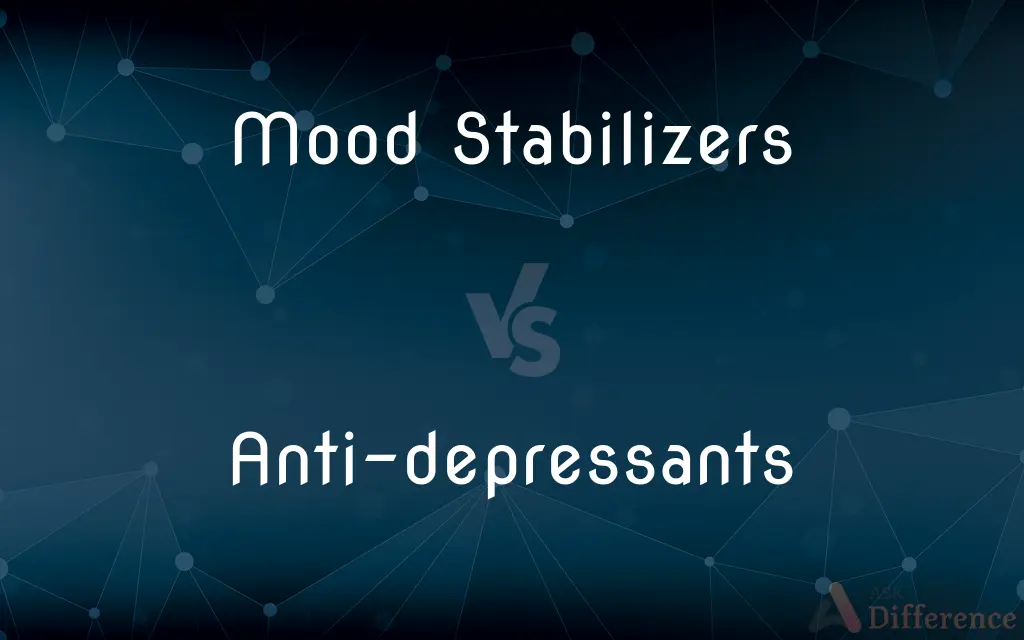Mood Stabilizers vs. Anti-depressants — What's the Difference?
By Tayyaba Rehman — Published on January 30, 2024
Mood stabilizers regulate mood swings, often in bipolar disorder, while antidepressants alleviate depression and anxiety symptoms.

Difference Between Mood Stabilizers and Anti-depressants
Table of Contents
ADVERTISEMENT
Key Differences
Mood stabilizers are medications primarily used to treat bipolar disorder by balancing mood swings. In contrast, antidepressants focus on relieving symptoms of depression and anxiety by altering brain chemistry.
While mood stabilizers aim to prevent extreme highs (mania) and lows (depression) in mood, antidepressants specifically work to elevate mood and alleviate the depressive state.
Mood stabilizers typically address a broader spectrum of mood disturbances, including manic episodes. Antidepressants, however, are primarily effective in treating various forms of depression and anxiety disorders.
The mechanism of action in mood stabilizers often involves regulation of neurotransmitters to stabilize mood, whereas antidepressants typically increase serotonin or norepinephrine levels to improve mood and mental state.
Mood stabilizers are crucial in the long-term management of bipolar disorder, reducing the frequency and intensity of episodes. Antidepressants are key in managing major depressive disorder, generalized anxiety disorder, and other related conditions.
ADVERTISEMENT
Comparison Chart
Primary Use
Balancing mood swings in bipolar disorder.
Treating depression and anxiety disorders.
Effect on Mood
Stabilizes both manic and depressive episodes.
Primarily elevates and stabilizes mood.
Types of Disorders Treated
Bipolar disorder, mood disorders.
Depression, anxiety, PTSD, OCD.
Typical Duration of Treatment
Often long-term to manage bipolar disorder.
Varies; can be short-term or ongoing.
Common Examples
Lithium, valproate, lamotrigine.
SSRIs (Prozac), SNRIs (Effexor), tricyclics.
Compare with Definitions
Mood Stabilizers
Drugs used to prevent extreme highs and lows in emotional states.
Mood stabilizers are essential in preventing manic episodes.
Anti-depressants
Medications designed to alleviate symptoms of depression.
He started taking antidepressants to help with his major depression.
Mood Stabilizers
Therapeutic compounds effective in managing mood instability.
Mood stabilizers are a key part of her treatment plan for mood regulation.
Anti-depressants
Drugs used to treat various mood disorders, including depression and anxiety.
Antidepressants can be effective for managing anxiety as well as depression.
Mood Stabilizers
Medications that help regulate mood swings in bipolar disorder.
After being diagnosed with bipolar disorder, John started taking mood stabilizers.
Anti-depressants
A class of drugs that help lift mood and improve feelings of well-being.
Antidepressants have significantly improved her overall mood and outlook.
Mood Stabilizers
A category of psychotropic medication primarily used to treat mood disorders.
Her psychiatrist prescribed mood stabilizers to balance her emotional fluctuations.
Anti-depressants
Medications that primarily act on brain chemicals to reduce symptoms of depression.
Her doctor prescribed antidepressants to balance the chemicals in her brain.
Mood Stabilizers
Medicines that help to maintain a stable mood in patients with bipolar disorder.
Mood stabilizers have helped her maintain a consistent mood without extreme changes.
Anti-depressants
Pharmaceutical agents used to treat depressive episodes and certain anxiety disorders.
Antidepressants have been effective in treating his symptoms of panic and depression.
Anti-depressants
Plural of anti-depressant
Common Curiosities
How do antidepressants work?
Antidepressants work by altering the balance of neurotransmitters in the brain, often improving mood and reducing symptoms of depression and anxiety.
Can mood stabilizers be used for depression?
Yes, some mood stabilizers can be effective in treating depressive episodes, particularly in bipolar disorder.
How long does it take for mood stabilizers to work?
Mood stabilizers may take several weeks to show full effects in stabilizing mood swings.
How long should one take antidepressants?
The duration varies; some people may need to take them for several months, while others may require longer treatment.
Are antidepressants addictive?
Most antidepressants are not considered addictive, but sudden discontinuation should be avoided due to potential withdrawal symptoms.
Can mood stabilizers cause weight gain?
Some mood stabilizers can lead to weight gain as a side effect.
Are there natural alternatives to antidepressants?
There are natural alternatives like St. John's Wort and exercise, but they should be used under medical guidance, especially when replacing prescribed medication.
Do antidepressants cure depression?
Antidepressants don't cure depression but are effective in managing its symptoms and improving quality of life.
Do antidepressants affect memory?
Some individuals may experience memory issues while on antidepressants, but this is not a common side effect.
What are mood stabilizers used for?
Mood stabilizers are used primarily for treating bipolar disorder and regulating mood swings.
Can antidepressants cause insomnia?
Some antidepressants can cause insomnia, while others may actually help improve sleep.
Do mood stabilizers affect creativity?
Mood stabilizers can affect creativity in some individuals, but effects vary widely.
Is it safe to drink alcohol while taking mood stabilizers?
It's generally not recommended to drink alcohol while taking mood stabilizers as it can interfere with the medication's effectiveness and increase side effects.
Can mood stabilizers be used for anxiety?
Mood stabilizers are not typically the first choice for treating anxiety, but they may be used in certain cases.
Are mood stabilizers safe during pregnancy?
The safety of mood stabilizers during pregnancy varies; it's crucial to consult with a healthcare provider for personalized advice.
Share Your Discovery

Previous Comparison
Punjabi vs. Gurumukhi
Next Comparison
NM3 vs. M3Author Spotlight
Written by
Tayyaba RehmanTayyaba Rehman is a distinguished writer, currently serving as a primary contributor to askdifference.com. As a researcher in semantics and etymology, Tayyaba's passion for the complexity of languages and their distinctions has found a perfect home on the platform. Tayyaba delves into the intricacies of language, distinguishing between commonly confused words and phrases, thereby providing clarity for readers worldwide.















































